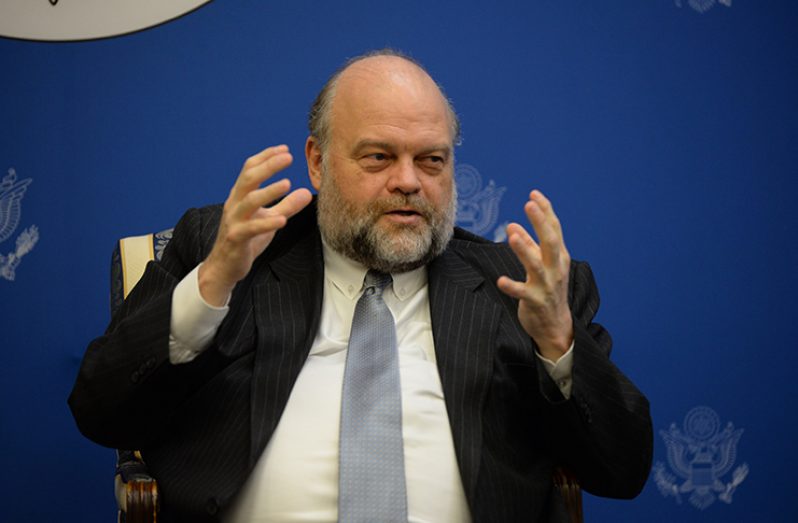…New US position on border controversy was not influenced by oil find
…Ambassador says matter was under consideration prior to 2015
OUTGOING United States (US) Ambassador Perry Holloway has assured that the US’ shift in position on the Guyana-Venezuela border controversy urging all parties to respect the 1899 arbitration decision was not influenced by Guyana’s oil find.
The announcement on was made on November 16, 2018 by Deputy Chief of Mission of the US Embassy in Guyana, Terry Steers-Gonzalez, during a farewell reception hosted at the ambassador’s residence. “Previously, we had simply supported the timely resolution of the Venezuela-Guyana border controversy. In large measure because of Ambassador Holloway, the US Government now calls on all parties to respect the 1899 arbitration decision,” Steers-Gonzalez had stated.
This week, Holloway clarified that the shift had to do with the current freefall of Venezuela’s economy than Guyana’s discovery in 2015. “We were working on changing the stance before the oil was discovered. I was in Washington and I was one of the people working on this stance, it’s too conservative. It was a very lawyerly stance in the sense that we encouraged both sides to resolve this controversy peacefully, which is not a bad statement to say, but it didn’t go further than that.”
“Even before oil was discovered, in fact, when oil was discovered no one knew it was going to be a big thing. It was important, but it wasn’t a big thing. So, the discovery of oil I think had very little to do with the change in our public talking points on the border controversy,” he said.
The ambassador then added: “I will say, what had more to do with that is what we have seen as, slowly, Venezuela’s democratic institution has been disintegrating before our eyes. People are starving, people can’t get medicine, that’s been concerning us for like four or five years and I think that was more driving the change in our talking point on the issue rather than the oil was.”
International newspapers such as the BBC have reported that “hyperinflation, power cuts and food and medicine shortages” are driving millions of Venezuelans out of the country primarily to neighboring states.
Many, in and out the country are blaming President Nicolás Maduro and his government for the nation’s crisis worsening since 2010 under the presidency of Hugo Chávez, succeeded by Maduro.
When US oil giant Exxon Mobil discovered oil off Guyana’s coast, an age-old dispute, once presumed settled, was resurrected by Maduro who issued a decree claiming sovereignty over Guyana’s territorial waters in the heart of the find. They country with one of the world’s largest oil suppliers contended that the Arbitral Award of 1899 was null and void.
The possible conflict which loomed caused the United Nations (UN) Secretary-General António Guterres, in keeping with the 1966 Geneva Agreement, to announce that the International Court of Justice (ICJ) would be the next means of resolution.
The ICJ had then fixed November 19, 2018 and April 18, 2019 as the respective time-limits for the filing of a Memorial by the Co-operative Republic of Guyana and a Counter-Memorial by the Bolivarian Republic of Venezuela respectively, although the latter objected.
Ambassador Holloway also spoke contrary to the rumored belief that US relations with Guyana is geared primarily towards protecting ExxonMobil’s interest in the country.
“If I were to ask US people in the US Government what our number one interest in Guyana is, I think that it still hasn’t changed. It has always been for the last 20 years in some form, good governance,” he began. “That is included of focus at times on human rights, at times on LGBTI rights [or] on local elections.”
The ambassador stated further that ExxonMobil continues to be treated just the same as any other local company with no special provisions besides the similar assistance provided to any American company seeking to do business in the country.
“The US government certainly has always been a staunch supporter and help and advocate for US companies doing business in any country, Guyana included, but all that we advocate for is a level playing field and equal treatment. In Guyana I don’t see that US companies—ExxonMobil or any US company—is treated any worse than Guyanese companies. They may all be treated bad some days and they may all be treated good some days but they’re not singling out American companies because they’re an American company and treating them bad. So, that’s our primary view,” Holloway said.



.jpg)








